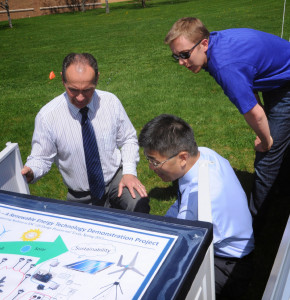Sustainability efforts earn campus big ranking
The SUNY Poly community continues doing its part for a brighter, cleaner, and greener tomorrow, with ongoing efforts in sustainability, with that progress receiving some national attention with a ranking in the 2016 Sustainable Campus Index from the Association for the Advancement of Sustainability in Higher Education (AASHE).
“I’m really proud of our Green Team’s efforts,” said Mark Bremer, Lecturer of Biology and Chair of the SUNY Poly Green Team. “We strive to incorporate best-practices in campus sustainability into all aspects of the university, including coordination and planning, operations, academics, and research. It’s an honor to be recognized for that.”
SUNY Poly was recognized as a Top Performer in the category of Coordination & Planning for “going above and beyond the standard self-reporting framework by collaborating with peer institutions to improve the quality and accuracy of current and future STARS reports,” according to the Index.
“We still have a lot of work to do to make the university more sustainable. We need increased access to funding for implementing creative green solutions. We must routinely track and measure progress toward goals we set,” said Bremer. “As always, we could use more involvement from students, staff, and faculty to inspire new ideas and really drive progress forward. Of course, we hope commitments to sustainability are made a priority for SUNY Poly’s future.”
AASHE highlights campuses for their efforts in advancing sustainability in higher education. The 2016 Sustainable Campus Index, a publication of the Association for the Advancement of Sustainability in Higher Education (AASHE), highlights innovative and high-impact initiatives from colleges and universities that submitted a Sustainability Tracking, Assessment & Rating System (STARS) report in the 12 months prior to July 1, 2016.
“It’s great to have such supportive colleagues who helped peer-review each other’s STARS submissions,” said Bremer. “We have an amazing community of SUNY Sustainability Coordinators and Directors who routinely rely on each other’s expertise and experience to learn what works on other campuses.”
Recent Comments
Archives
- September 2018
- August 2018
- May 2018
- April 2018
- March 2018
- February 2018
- January 2018
- December 2017
- November 2017
- October 2017
- September 2017
- May 2017
- April 2017
- March 2017
- February 2017
- January 2017
- December 2016
- November 2016
- October 2016
- September 2016
- August 2016
- May 2016
- April 2016
- March 2016
- February 2016
- January 2016
- December 2015
- November 2015
- October 2015
- September 2015
- August 2015
- May 2015
- April 2015
- March 2015
- February 2015
- January 2015
- December 2014
- November 2014
- October 2014
- September 2014
- August 2014
- May 2014
- April 2014
- March 2014
- February 2014
- January 2014
- December 2013
- November 2013
- October 2013
- September 2013
- August 2013
- June 2013
- May 2013
- April 2013
- March 2013
- February 2013
- January 2013
- December 2012
- November 2012

